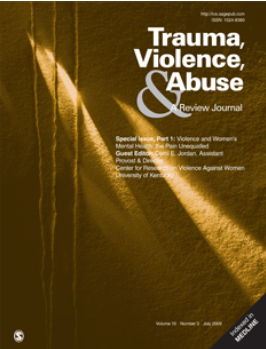Early Parent–Child Relationship in the Shadow of War-Related Trauma: A Systematic Review
IF 5.4
1区 社会学
Q1 CRIMINOLOGY & PENOLOGY
引用次数: 0
Abstract
War-related trauma has detrimental effects on millions of individuals worldwide, including infants, toddlers, and their parents. Among various adverse outcomes, this trauma may significantly disrupt the essential sense of security crucial for fostering a healthy early parent–child relationship. Yet, research on the effects of war-related trauma on parent–child relationships remains limited. This study aimed to bridge this gap by synthesizing evidence from empirical studies focused on war-related trauma and early parent–child relationship outcomes from 0 to 3 years. Studies were identified by searching across multiple databases. The inclusion criteria encompassed studies examining the effects of exposure to war, armed conflict, or terrorism, focusing on the parent–young child relationship, published in English, peer-reviewed, and accessible. Eleven studies, published in 23 articles, met these criteria. The research findings revealed various impacts on the parent–child relationship due to exposure to war-related trauma. Notably, parents’ emotional distress and post-traumatic stress disorder, rather than their direct trauma exposure, were associated with adverse parent–child relational outcomes within the parent–child relationship, such as parents’ insensitive, inconsistent, hostile, and anxious behaviors toward their children, as well as children’s vigilance and unresponsive behaviors toward their parents. This research indicates various ways that war-related trauma may impact early parent–child relationships, highlighting directions for future research and offering insights that could assist in developing trauma-informed interventions focused on parent–child dyads experiencing war-related adversity.战争创伤阴影下的早期亲子关系:系统回顾
与战争有关的创伤对全世界数以百万计的人造成了不利影响,包括婴儿、幼儿和他们的父母。在各种不良后果中,这种创伤可能会严重破坏对培养健康的早期亲子关系至关重要的基本安全感。然而,关于战争创伤对亲子关系影响的研究仍然有限。本研究旨在通过综合以战争相关创伤和0至3岁早期亲子关系结果为重点的实证研究证据,弥合这一差距。研究是通过在多个数据库中搜索来确定的。纳入标准包括研究暴露于战争、武装冲突或恐怖主义影响的研究,重点关注父母与幼儿的关系,以英文出版,同行评审,并可获取。发表在23篇文章中的11项研究符合这些标准。研究结果揭示了战争创伤对亲子关系的各种影响。值得注意的是,父母的情绪困扰和创伤后应激障碍,而不是他们的直接创伤暴露,与亲子关系中的不良亲子关系结果相关,如父母对孩子的不敏感、不一致、敌对和焦虑行为,以及孩子对父母的警惕和无反应行为。本研究指出了战争相关创伤可能影响早期亲子关系的各种方式,强调了未来研究的方向,并提供了有助于开发创伤知情干预措施的见解,重点关注经历战争相关逆境的亲子双元。
本文章由计算机程序翻译,如有差异,请以英文原文为准。
求助全文
约1分钟内获得全文
求助全文
来源期刊

Trauma Violence & Abuse
Multiple-
CiteScore
13.60
自引率
7.80%
发文量
131
期刊介绍:
Trauma, Violence, & Abuse is devoted to organizing, synthesizing, and expanding knowledge on all force of trauma, abuse, and violence. This peer-reviewed journal is practitioner oriented and will publish only reviews of research, conceptual or theoretical articles, and law review articles. Trauma, Violence, & Abuse is dedicated to professionals and advanced students in clinical training who work with any form of trauma, abuse, and violence. It is intended to compile knowledge that clearly affects practice, policy, and research.
 求助内容:
求助内容: 应助结果提醒方式:
应助结果提醒方式:


